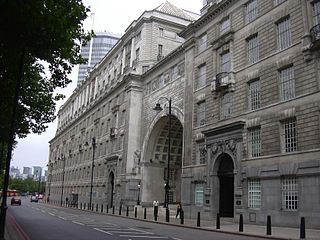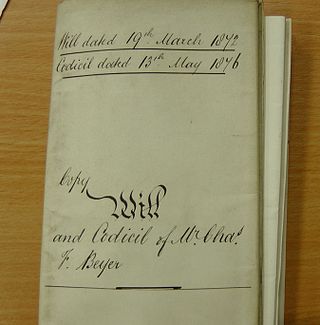A mortgage is a legal instrument of the common law which is used to create a security interest in real property held by a lender as a security for a debt, usually a mortgage loan. Hypothec is the corresponding term in civil law jurisdictions, albeit with a wider sense, as it also covers non-possessory lien.

In finance, a security interest is a legal right granted by a debtor to a creditor over the debtor's property which enables the creditor to have recourse to the property if the debtor defaults in making payment or otherwise performing the secured obligations. One of the most common examples of a security interest is a mortgage: a person borrows money from the bank to buy a house, and they grant a mortgage over the house so that if they default in repaying the loan, the bank can sell the house and apply the proceeds to the outstanding loan.

Beswick v Beswick[1967] UKHL 2, [1968] AC 58 was a landmark English contract law case on privity of contract and specific performance. The Lords, overruling the decision of Lord Denning in the Court of Appeal, ruled that a person who was not party to a contract had no independent standing to sue to enforce it, even if the contract was clearly intended for their benefit.
English property law is the law of acquisition, sharing and protection of valuable assets in England and Wales. While part of the United Kingdom, many elements of Scots property law are different. In England, property law encompasses four main topics:

Lloyds Bank plc v Rosset[1990] UKHL 14 is an English land law, trusts law and matrimonial law case. It specifically deals with the translation into money of physical contributions from a cohabitee or spouse, under which its principles have been largely superseded.

Daulia Ltd v Four Millbank Nominees Ltd [1977] is an English contract law case, concerning unilateral contracts, and when embarking on the performance of an act for which an offer is open, at what point the offer may be withdrawn. In particular, Goff LJ observed that there would be a duty to not prevent full performance of terms in a unilateral offer, once performance had begun.

Williams & Glyn's Bank v Boland [1980] is a House of Lords judgment in English land and trusts law on an occupier's potentially overriding interests in a home.

City of London Building Society v Flegg[1987] UKHL 6 is an English land law case decided in the House of Lords on the relationship between potential overriding interests and the concept of overreaching.

Unregistered land in English law is land that has not been registered with HM Land Registry. Under the residual principles of English land law, for unregistered land proof of title is based upon historical title deeds and a registry for certain charges under the Land Charges Act 1972.
Formalities in English law are required in some kinds of transaction by English contract law and trusts law. In a limited number of cases, agreements and trusts will be unenforceable unless they meet a certain form prescribed by statute. The main kinds of formality that a statute can require are to put the transaction in writing, to make a deed, or to register it at a government registrar.

Dillwyn v Llewelyn [1862] is an 'English' land, probate and contract law case which established an example of proprietary estoppel at the testator's wish overturning his last Will and Testament; the case concerned land in Wales demonstrating the united jurisdiction of England and Wales.

English land law is the law of real property in England and Wales. Because of its heavy historical and social significance, land is usually seen as the most important part of English property law. Ownership of land has its roots in the feudal system established by William the Conqueror after 1066, and with a gradually diminishing aristocratic presence, now sees a large number of owners playing in an active market for real estate.

Re Draper’s Conveyance [1967] is an English land law case, concerning co-ownership of land.

Harris v Goddard [1983] 3 All ER 242 is an English land law and matrimonial law case, concerning co-owned land between spouses and finding as to the effect of a divorce petition.

Kinch v Bullard [1998] 4 All ER 650 is an English land law case, concerning co-ownership of land and an act of severance of a joint tenancy, whether caught by the deemed-delivered provisions of the common law postal rule.

Re Dennis [1996] Ch 80 is an English land law case, concerning co-ownership of land.
Burgess v Rawnsley [1975] Ch 429 is an English land law case, concerning co-ownership of land, and the conditions for severance of a joint tenancy in a circumstances where there is not a domestic relationship, that is two or more owners living together, co-occupancy.

Re K [1985] Ch 180 is an English land law case of acts of severance of a joint tenancy.
Mortgages in English law are a method of raising capital through a loan contract. Typically with a bank, the lender/mortgagee gives money to the borrower/mortgagor, who uses their property/land/home as security that they will repay the debt and any relevant interest. If the mortgagor fails to repay, then the mortgaged property which has been used as security may be subject to various mortgagee remedies allowing them to retrieve the debt. Mortgages are an important part of English land law and property law. These concern, first, the common law, statutory and regulatory rules to protect the mortgagor at the time of concluding the mortgage agreement. Second, English law defines and restricts the process for taking possession of property in the event of default. Third, it places duties on mortgagees on the price it achieves when selling property.

Palk v Mortgage Services Funding plc [1993] Ch 330 was a judicial decision of Court of Appeal of England and Wales relating to the enforcement of mortgages. The case concerned seeking an order for sale of the property through the courts, but it was slightly unusual in that it was the mortgagors who were seeking the order for sale, but the finance company holding the mortgage who were opposing it.













